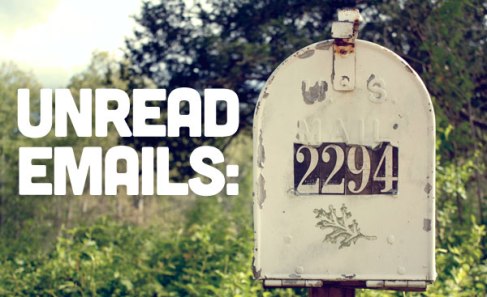So, I should probably start this off by confessing that I am terrible at managing emails myself. While I have hitherto resisted the urge to link my work email to my smartphone, I am totally that person who looks at email right after she wakes up and right before she goes to bed. Most of the time, I love the leveling capacity of email, because it means that I have access to international experts who can help me with a research project and who I would never dare to pick up the phone and call. But that means that my students have the same increased access to me, and this can sometimes feel overwhelming. And while I don’t generally like the tone of Salon’s fake syllabus, I do think that we’ve all felt like this at one time or another:
This semester, we’re going to try something different. Here is the phone number to my home, where I live with my wife and kids and, for all you know, one or more disabled elderly persons: 228-1745. If what you have to tell me about the unfairness of my grading policy is important enough to call, dial away. Yeah, I didn’t think so.
Thus, I do have a few policies regarding emails. The first is that I get 24 hours to respond to any email. I am very upfront about this on the first day of classes, and I tell my students that the same thing applies to my TAs. Oftentimes, I am much faster than this – a fact that, sadly, my students seem to pick up on very quickly – but I try to make it clear from the get-go that I will not always reply quickly and that students should plan accordingly. This rule means that I can preserve a safe space for “date night,” or make a claim longer stretches of time at conferences, during which I do not have to feel guilty about ignoring my email.
[There have been days, particularly when organizing conferences or teaching those 150-seat lectures]
Similarly, I will not answer my email after 11:00 pm the night before an assignment is due. I may or may not check my email more frequently leading up to that cutoff, but if your email isn’t in my inbox before then, I’m sorry, but I have absolutely no obligation whatsoever to read it. Since academics often perceive what they do more as a lifestyle/vocation than as a job/career, there is a tendency to be at one’s computer after this time and thus a temptation to read and answer emails as well. Whether or not I’m at my computer, however, I refuse to answer such emails on principle. I should not be expected to be there, and I am already going above and beyond by checking in as late as I do.
As for those emails which ask questions that are answered on the syllabus, I will answer them, but the reply may come in a form that not everyone likes: a stock answer with a link to the syllabus. If an email contains a question about formatting footnotes, the reply will likely be the same, but with a link to the Chicago Manuel of Style’s Quick Citation Guide instead. And finally, if the email is a question about something that its author could have found the answer to by Googling, I will be polite, even if it’s hard sometimes because I’m tired or stressed. That said, I will be grumpy and will probably also include a statement about the importance of pro-active learning.
OK, so I did once actually compose a reply that just had a link to Let Me Google That For You, but I thought better of sending it at the last moment. If we want our students to be respectful towards us, we owe them the same courtesy in return. And sometimes I forget to Google shit myself, and/or just need the reinforcement of hearing from an authority figure. So yeah, I take a deep breath and try to be professional.
If I receive emails that are disrespectful or extremely informal, I make it a policy to address all the issues contained therein, but I also indicate to the student that I find their behavior inappropriate. This can be hard to do in a tone that will not cause alarm (tone is notoriously difficult to communicate in writing), but I think it’s extremely important, so I’m willing to put in the extra time to make sure that my email reads properly and sends what I hope is the right message. People will never learn not to send such emails unless someone points out that it’s a problem, and in most cases, students have been mortified to discover that their emails were conveying the wrong message. So for their sake, as much as mine, I try to flag these issues.
[It seems obvious that this is a little much when you’re the recipient, but sometimes a stressed-out sender doesn’t think about how it will come across. Give them the benefit of the doubt, and let them know politely that their communication seems a little aggressive instead of just assuming they’re trying to bully you. I’ve also seen large fonts, and a lot of red.]
That’s pretty much it for how I approach the issue of email right now, but I’ve started to feel like perhaps I need to be even more strategic when teaching those large classes. It can be easy for email to take over one’s life, and so I’m currently toying with the idea of stealing the “email hours” concept from a friend. This would mean having set hours each day outside of which I do not check my email. Students would therefore know when to expect a response, and I would be less easily sidetracked from other work.
I also want to start using another strategy to which I was recently exposed. When I don’t yet know the answer to a question and have to do more digging, instead of telling the student that “I’ll get back to them,” I will now say “I will get back to you with more information by ______.” This helps the student relax until that time, and gives me a firm deadline to work with as well. It’s thus a good way of avoiding panicked reminder emails if you’re one of those folks (like me) who doesn’t need them. If you do need reminders, it’s probably better not to go this route and instead to write something like “if you don’t hear back from me by ______, please email me to remind me.”
Well, that’s all I have for now, but I’m sure I’m missing a ton of interesting strategies. I’d also be curious to hear how easy or hard people find it to get to “inbox 0” every day, or if this is something you even worry about at all. Thus, please leave comments below. I’d love to hear from you!


